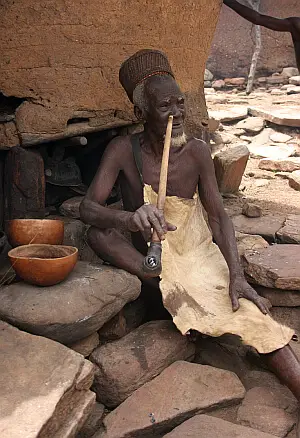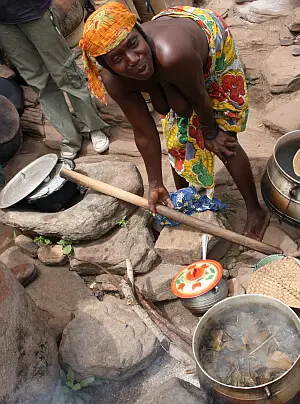The Medicine Man in Benin

The Medicine Man in Benin
Story and photos by James Michael Dorsey
A seeker goes in search of a famed voodoo practitioner in Benin, where the spirit worlds and physical worlds are closely intertwined.

I went to Africa in search of a medicine man.
Whatever actually happened that day, I have witnessed far too many phenomena in my travels to dismiss anything out of hand, and after my visit with Namari I believe more than ever that the truth is still out there.
Myths and legends abound on the vast African continent and storytelling is an honored art, especially in societies that lack a written language. Stories tend to grow in the process over time, taking on the flavor of the individual relating them.
I had heard many things about this particular medicine man.
He was credited with being a shape shifter who became a panther at night to watch over his village and many said he could fly, but his greatest power was the supposed ability to make rain. Such attributes are not uncommon in the stories of Africa but the truth within them often is.
I have met many such people in my journeys, both men and women, who claimed unusual abilities. Most of them have perpetuated their own myths. A few have lived up to expectations, while some have been outright charlatans. All have been worth visiting to find out because to quote Fox Mulder, “The truth is out there.”
Finding Namari
Namari Godogo first came to my attention in a magnificent coffee table book by the renowned photographers Angela Fisher and Carol Beckwith, Faces of Africa. His fame was far and wide in the Taneka region of Benin, a land marinated in voodoo for over 6,000 years.
I have personally felt the power of being in such a vortex. Voodoo shrouds this land like a fog, not just as a religion but a complete way of life. There is no differentiation between waking reality and the spirit world. Entire houses are fetishes with clay watchmen bearing cowrie eyes standing guard for evil spirits and house doors themselves are gaping mouths ready to devour any evil entity that may try to enter.

Voodoo is a topic that mostly eludes western minds but it is an established religion in West Africa where an estimated 60% of the population practices one form of it or another. To this day it is the official state religion of Benin. Its origin is documented in a petroglyph no more than a mile from Namari’s village, with the oldest known representation of an animist ceremony carved in stone: people with arms raised in supplication to the sun and moon while others dance around a fire.
Most westerners envision dolls stuck full of pins and zombies wandering the land, and admittedly, there is a dark side to some of it, but that aspect mostly migrated to the Caribbean in the hulls of slave ships long ago. West African voodoo today is an accepted belief system that assists people coping with difficult lives in a harsh environment. Men with reputations like Namari are not uncommon in Taneka.
The Smoking Holy Man
My driver left me at a crossroads and pointed down a trail into the forest. I passed animal jawbones nailed to trees; gris-gris in the local lingua-franca: fetishes that confront spirits. At the first village, monkey skulls were imbedded in clay walls of homes and even the smallest child wore an amulet as protection. Carved wooden dolls abounded, available for a price to cast a spell on an enemy or convince a young lady to give her love.

Amongst all the authentica there was also a good deal of cheap tourist junk offered to the day trippers and trekkers intrepid enough to wander this far off the beaten path even though in two weeks I had not seen another westerner. I never cease to marvel at how commercialism has spread its tentacles into the most remote of places.
Namari Godogo would be called a witch doctor by western standards but at home in Benin, he is a revered holy man. The morning I came upon him he was sitting placidly in front of a mud hut wreathed in a mantle of ganja smoke inhaled from a three foot long clay pipe, the type of which Taneka men favor. Other than a woven reed hat he was naked and he pulled a small animal skin over his privates at my approach but in no other way did he acknowledge my presence. He had the leathery chocolate skin of a life spent under the equatorial sun that defied assigning him an age. His chin hosted a small white beard. His eyes appeared glazed and yellow but whether from drugs, jaundice, or mystical trance I could not tell.
I sat down nearby to simply observe. Several small children ran noisily amuck while an aging woman with heavy pendulous breasts stirred a large pot issuing an unforgettable pungent aroma. When I finally spoke directly to Namari his trance-like stare continued straight ahead until a young man dressed in the local style of loose fitting and colorful pajamas approached and said in passable English, “You have questions for my father?”

Apparently enough trekking companies had discovered Namari that he had become a sometimes stop on their itineraries. Now he required a major domo to ward off tourists. Immediately my guard went up because as so often happens when enlightened people or those with special abilities become inundated with admirers, they develop a commercial side for profit while keeping their true self hidden. Safari companies are notorious for exploiting people such as Namari and yet, I sensed he was the real thing.
My questions were answered through the young man in a very generic style. He revealed that most of the young children were indeed the issue of Namari and that the lady was one of his wives. By then the old man’s eyes were upon me and I sensed he might be intrigued that I was not from a safari group but an actual pilgrim in search of learning. It was quite hard to break from his stare.
Questions for the Master
At that point I asked him directly if he could fly and he held my gaze, answering through the young man with a question of his own. “Did you fly to come here?”
His awareness of airplanes caught me off guard somewhat and I stammered out a “Yes.”
He followed then with, “Do you see God when you fly?”
I answered an obvious” No.”
“Then what good is flying?” he asked and I detected s a slight Leonardo-esque smile on the corners of his mouth. That was one for Namari.
Next I asked if he could make it rain and I detected only a slight movement of his eyes as he glanced to the south and for the first time I noticed towering black clouds approaching with perfect timing. They had obviously been there all morning but his intimation of responsibility was so subtle and profound that I could only smile and nod. Two for Namari.
This was indeed a very wise and learned man, if not formally educated, then certainly schooled in the ancient ways of his people. Every question I asked was parried with a cryptically enticing retort. I would ask several personal questions then try to slip one in about special powers he might possess but he adroitly sidestepped each one like a boxer evading punches, while throughout it all I got the feeling that he was probing my inner self in some way I could not fathom. His eyes told me he was definitely studying me and I felt he had some great personal insight to people, perhaps akin to an accomplished philosopher or even a psychiatrist.

The afternoon passed in this enjoyable manner and when I got up to leave he extended a hand. It was warm and soft like a young child’s and he grasped mine in a surprisingly strong grip, holding me for several seconds with both his hand and his eyes. With a slight nod to his wife, she dipped a long ladle into her concoction and offered it to me to drink. It was hot and bitter and I took just enough to be polite, then with a slight bow to both of them I started my way down the trail.
Leaving and Levitating in Benin
I suddenly felt very light and carefree but not like I had imbibed any kind of drug. It was more like suddenly being unusually aware of my surroundings. I turned after a few feet for a final look and Namari was still sitting with his pipe but I swear he seemed to be floating several inches in the air. I instinctively took off my sunglasses and of course he was seated on the ground where he had been all day long.
I turned to continue down the trail again and stepped off into the bush to catch a final glance back and once again Namari appeared to be floating above the ground. Even though I was secreted in the foliage, I am sure he was looking directly at me this time. I could swear that in broad daylight his eyes possessed that golden reflection one sees at night when shining a light into the eyes of a large cat. A few moments later, it started to rain.
I’ve thought long and hard about what I witnessed that day in the bush and the truth is I really have no idea what I saw. Was I given a drug by his wife? Did he somehow manage to subtly hypnotize me?

Part of me desperately wants to believe in occult powers once available to all mankind but grown vestigial in those of us gone soft from prolonged city life. I want to experience the powers sustained by centuries of practice and ceremony by remote peoples many refer to as “primitive.” The logical side of me says he could not possibly have been levitating and it was my own wishful subconscious conjuring up the desired effect. I think anyone who seeks out people like Namari do so with a desire to prove to themselves that such people really do possess powers unavailable to the rest of us and I readily admit that I am one of them. Levitation or not, the image of Namari floating lightly off the ground is forever imbedded in my mind.
James Michael Dorsey is an explorer, author, and photographer who has traveled extensively in forty-some countries, mostly far off the beaten path. His primary interest is in documenting indigenous people in Asia and Africa. He is a fellow of the Explorers Club, and a member and former director of the Adventurers Club. See more at www.jamesdorsey.com.
Related Features:
Dancing With the Dead in Benin by James Michael Dorsey
Tracking the Hadzabe: Little is Changed in one of Africa's Last Remaining Bush Tribes by Shelley Seale
The Mursi, Money, and Mayhem by James Michael Dorsey
See other Africa travel stories from the archives
Copyright © Perceptive Travel 2016. All rights reserved.
- Looting Memory in Corinthian Greece by David Lee Drotar
- On Beauty and Foie Gras in Southwestern France by Beebe Bahrami
- World Music Reviews
- Travel Book Reviews
Books from the Author:

Buy Vanishing Tales from Ancient Trails at your local bookstore, or get it online here:
Amazon US
Amazon Canada
Amazon UK
Kobo

Buy Tears, Fear and Adventure at your local bookstore, or get it online here:
Amazon US
Amazon Canada
Amazon UK

